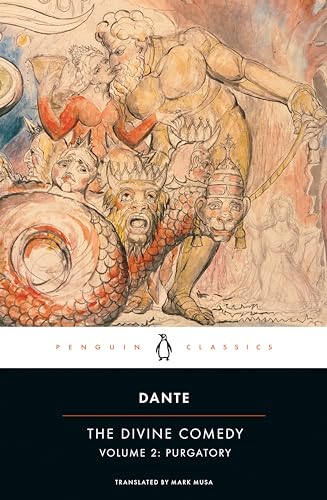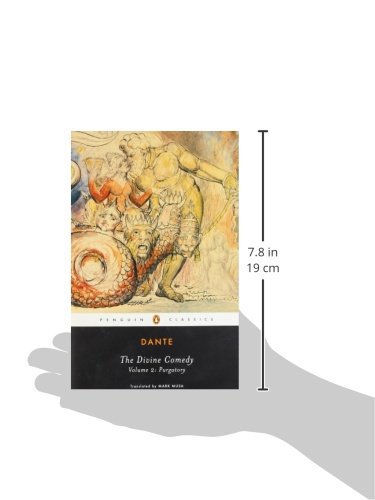The Divine Comedy: Volume II: Purgatory
The Divine Comedy: Volume II: Purgatory is backordered and will ship as soon as it is back in stock.
Couldn't load pickup availability
Genuine Products Guarantee
Genuine Products Guarantee
We guarantee 100% genuine products, and if proven otherwise, we will compensate you with 10 times the product's cost.
Delivery and Shipping
Delivery and Shipping
Products are generally ready for dispatch within 1 day and typically reach you in 3 to 5 days.
Author: Alighieri, Dante
Brand: Penguin
Color: Tan
Edition: 2
Binding: Paperback
Number Of Pages: 428
Release Date: 01-02-1985
Part Number: 9780140444421
Details: Product Description
Beginning with Dante's liberation from Hell, Purgatory relates his ascent, accompanied by Virgil, of the Mount of Purgatory - a mountain of nine levels, formed from rock forced upwards when God threw Satan into depths of the earth. As he travels through the first seven levels, Dante observes the sinners who are waiting for their release into Paradise, and through these encounters he is himself transformed into a stronger and better man. For it is only when he has learned from each of these levels that he can ascend to the gateway to Heaven: the Garden of Eden. The second part of one of the greatest epic poems, Purgatory is an enthralling Christian allegory of sin, redemption and ultimate enlightenment.
Review
“The English Dante of choice.” –Hugh Kenner
“Exactly what we have waited for these years, a Dante with clarity, eloquence, terror, and profoundly moving depths.” –Robert Fagles, Princeton University
“A marvel of fidelity to the original, of sobriety, and truly, of inspired poetry.” –Henri Peyre, Yale University
About the Author
Dante Alighieri was born in Florence in 1265 and belonged to a noble but impoverished family. He met Beatrice, who was to be his muse, in 1274, and when she died in 1290 he sought distraction in philosophy and theology, and wrote
La Vita Nuova. He worked on the
Divine Comedy from 1308 until near the time of his death in Ravenna in 1321.
Excerpt. © Reprinted by permission. All rights reserved.
Purgatory
By Dante Alighieri
Penguin Books
Copyright ©1985
Dante AlighieriAll right reserved.
ISBN: 0140444424
Foreword
If a poem is not forgotten as soon as the circumstances of its origin, it beginsat once to evolve an existence of its own, in minds and lives, and then even inwords, that its singular maker could never have imagined. The poem that survivesthe receding particulars of a given age and place soon becomes a shiftingkaleidoscope of perceptions, each of them in turn provisional and subject totime and change, and increasingly foreign to those horizons of human historythat fostered the original images and references.
Over the years of trying to approach Dante through the words he left and some ofthose written about him, I have come to wonder what his very name means now, andto whom. Toward the end of the Purgatorio, in which the journeyrepeatedly brings the pilgrim to reunions with poets, memories and projectionsof poets, the recurring names of poets, Beatrice, at a moment of unfathomableloss and exposure, calls the poem's narrator and protagonist by name, "Dante,"and the utterance of it is unaccountably startling and humbling. Even though itis spoken by that Beatrice who has been the sense and magnet of the whole poemand, as he has come to imagine it, of his life, and though it is heard at thetop of the mountain of Purgatory, with the terrible journey done and theprospect of eternal joy ahead, the sound of his name at that moment is not atall reassuring. Would it ever be? And who would it reassure? There was, andthere is, first of all, Dante the narrator. And there was Dante the man livingand suffering in time, and at once we can see that there is a distinction, adivision, between them. And then there was, and there is, Dante therepresentation of Everyman, of a brief period in the history of Italy and ofFlorence, of a philosophical position, a political allegiance ? the list isindeterminate. Sometimes he seems to be all of them at once, and sometimesparticular aspects occupy the foreground.
The commentaries date back into his own lifetime ? indeed, he begins themhimself, with the Vita Nuova ? and the exegetes recognized from thebeginning, whether they approved or not, the importance of the poem, the work,the vision, as they tried to arrive at some fixed significance in those words,in a later time when the words themselves were not quite the same.
Any reader of Dante now is in debt to generations of scholars working forcenturies to
EAN: 9780140444421
Package Dimensions: 7.7 x 5.2 x 0.9 inches
Languages: English









